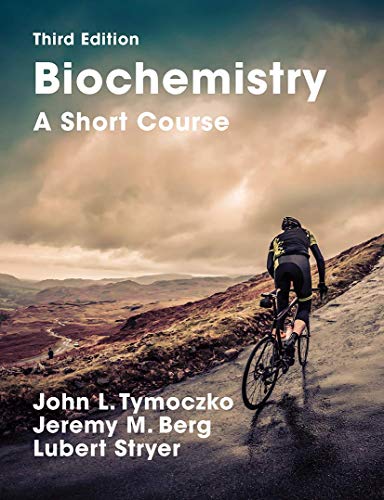- Biochemistry Short Course 3rd Edition
- Biochemistry A Short Course
- Biochemistry A Short Course Download
- Tymoczko Biochemistry 3rd Pdf


- Test Bank for Biochemistry A Short Course 3rd Edition by Tymoczko IBSN 130. 'Test bank for advanced practice nursing in the care of older adults 1st.
- Biochemistry: A Short Course: International Edition Paperback – 10 Apr 2012. USA, where he has been on the faculty since 1976. The publication of his first edition of Biochemistry in 1975 transformed the teaching of Biochemistry. 1 customer review. 5.0 out of 5 stars. 5.0 out of 5 stars. 5 star: 100%: 4 star 4 star (0%) 0%.
Biochemistry Short Course 3rd Edition

Biochemistry for Medical Professionals 1st Edition. Biochemistry: A Short Course Third Edition. Thinking About Biology An Introductory Laboratory Manual 5th Edition. By Mimi Bres. Campbell Biology in Focus 2nd Edition. Access Biochemistry: A Short Course 1st Edition Chapter 34 solutions now. Our solutions are written by Chegg experts so you can be assured of the highest quality!
About the Author:Biochemistry A Short Course
John L. Tymoczko is Towsley Professor of Biology at Carleton College, where he has taught since 1976. He currently teaches Biochemistry, the Metabolic Basis
of Human Disease, Oncogenes and the Molecular Biology of Cancer, and Exercise Biochemistry and co-teaches an introductory course, Energy Flow in Biological
Systems. Professor Tymoczko received his B.A. from the University in Chicago in 1970 and his Ph.D. in Biochemistry from the University of Chicago with
Shutsung Liao at the Ben May Institute for Cancer Research in 1973. He then held a postdoctoral position with Hewson Swift of the Department of Biology at
the University of Chicago. The focus of his research has been on steroid receptors, ribonucleoprotein particles, and proteolytic processing enzymes.
Biochemistry A Short Course Download
Jeremy M. Berg received his B.S. and M.S. degrees in Chemistry from Stanford (where he did research with Keith Hodgson and Lubert Stryer) and his Ph.D. in Chemistry from Harvard with Richard Holm. He then completed a postdoctoral fellowship with Carl Pabo in Biophysics at Johns Hopkins University School of Medicine. He was an Assistant Professor in the Department of Chemistry at Johns Hopkins from 1986 to 1990. He then moved to Johns Hopkins University School of Medicine as Professor and Director of the Department of Biophysics and Biophysical Chemistry, where he remained until 2003. He then became Director of the National Institute of General Medical Sciences at the National Institutes of Health. In 2011, he moved to the University of Pittsburgh where he is now Professor of Computational and Systems Biology and Pittsburgh Foundation Chair and Director of the Institute for Personalized Medicine. He served as President of the American Society for Biochemistry and Molecular Biology from 2011-2013. He is a Fellow of the American Association for the Advancement of Science and a member of the Institute of Medicine of the National Academy of Sciences. He received the American Chemical Society Award in Pure Chemistry (1994) and the Eli Lilly Award for Fundamental Research in Biological Chemistry (1995), was named Maryland Outstanding Young Scientist of the Year (1995), received the Harrison Howe Award (1997), and received public service awards from the Biophysical Society, the American Society for Biochemistry and Molecular Biology, the American Chemical Society, and the American Society for Cell Biology. He also received numerous teaching awards, including the W. Barry Wood Teaching Award (selected by medical students), the Graduate Student Teaching Award, and the Professor s Teaching Award for the Preclinical Sciences. He is coauthor, with Stephen J. Lippard, of the textbook Principles of Bioinorganic Chemistry. Lubert Stryer is Winzer Professor of Cell Biology, Emeritus, in the School of Medicine and Professor of Neurobiology, Emeritus, at Stanford University,
where he has been on the faculty since 1976. He received his M.D. from Harvard Medical School. Professor Stryer has received many awards for his research on the
interplay of light and life, including the Eli Lilly Award for Fundamental Research in Biological Chemistry, the Distinguished Inventors Award of the Intellectual
Property Owners Association, and election to the National Academy of Sciences and the American Philosophical Society. He was awarded the National Medal
of Science in 2006. The publication of his first edition of Biochemistry in 1975 transformed the teaching of biochemistry.'
'About this title' may belong to another edition of this title.
Tymoczko Biochemistry 3rd Pdf
The Second Edition has been fully updated with coverage of recent developments in biochemistry and human health. New Metabolism in Context sections show how new information on the role of leptins in hunger and satiety has changed the way biochemists think about obesity and diabetes. In addition to diet and obesity, other Metabolism in Context features focus on metabolism and cancer, and metabolism and exercise. The Experimental Techniques chapters (available on the companion website) have also been updated and expanded, exploring important techniques used by biochemists in the past as well as new technologies with which biochemists make discoveries in present-day laboratories. (This title may not be available in all areas. Please contact your representative for more information.)
show more



